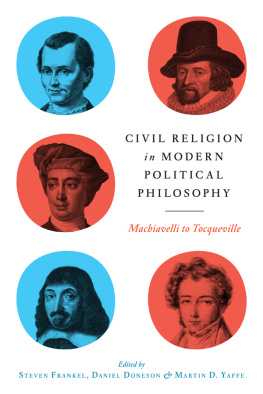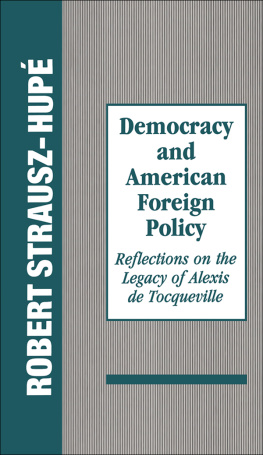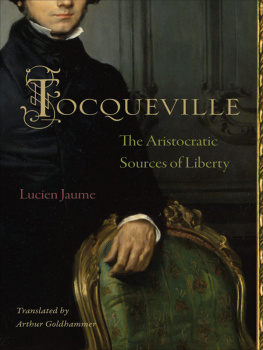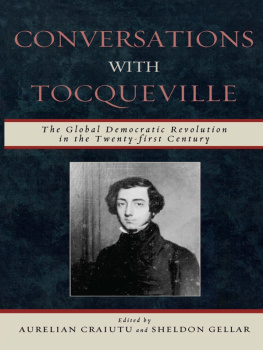Alexis de Tocqueville and the Art of
Democratic Statesmanship
Alexis de Tocqueville and the Art of
Democratic Statesmanship
Edited by Brian Danoff and L. Joseph Hebert, Jr.

Published by Lexington Books
A division of Rowman & Littlefield Publishers, Inc.
A wholly owned subsidiary of The Rowman & Littlefield Publishing Group, Inc.
4501 Forbes Boulevard, Suite 200, Lanham, Maryland 20706
http://www.lexingtonbooks.com
Estover Road, Plymouth PL6 7PY, United Kingdom
Copyright 2011 by Lexington Books
All rights reserved. No part of this book may be reproduced in any form or by any electronic or mechanical means, including information storage and retrieval systems, without written permission from the publisher, except by a reviewer who may quote passages in a review.
British Library Cataloguing in Publication Information Available
Library of Congress Cataloging-in-Publication Data
Alexis de Tocqueville and the art of democratic statesmanship / edited by Brian Danoff and L. Joseph Hebert.
p. cm.
Includes index.
ISBN 978-0-7391-4529-6 (cloth : alk. paper) ISBN 978-0-7391-4530-2 (pbk. : alk. paper)
1. Tocqueville, Alexis de, 18051859.Political and social views. 2. Democracy. 3. Political leadership. 4. Political sciencePhilosophyHistory19th century. I. Danoff, Brian. II. Hebert, L. Joseph (Louie Joseph), 1975
JC229.T8A425 2011
321.8dc22
2010039838
 The paper used in this publication meets the minimum requirements of American National Standard for Information SciencesPermanence of Paper for Printed Library Materials, ANSI/NISO Z39.48-1992.
The paper used in this publication meets the minimum requirements of American National Standard for Information SciencesPermanence of Paper for Printed Library Materials, ANSI/NISO Z39.48-1992.
Printed in the United States of America
Contents
Brian Danoff
Alexis de Tocqueville, President of the Academy
Susan McWilliams
Aristide Tessitore
Khalil M. Habib
F. Flagg Taylor IV
Richard Boyd and Conor Williams
William B. Parsons, Jr.
Thad Williamson
Albert W. Dzur
Derek Barker
Jon D. Schaff
L. Joseph Hebert, Jr.
Peter Augustine Lawler
Paul Carrese
Thomas L. Pangle
Acknowledgments
We are deeply grateful to the contributors for their generous and spirited efforts. Thanks are also due to Joseph Parry, Jana Wilson, Erin Walpole, Amy King, Patricia Stevenson, and others at Lexington Books for embracing this project and for ushering us through the publication process so ably.
Brian Danoff is indebted to his wife and son for their love and support. He dedicates this volume to his parents, with gratitude for all that they have taught him.
Joe Hebert would like to thank Brian Danoff for conceiving this project and for his patience and diligence in seeing it through. He dedicates this volume to his beloved wife, Elena.
Brian Danoff
Harvey Mansfield and Delba Winthrop have written that Democracy in America is at once the best book ever written on democracy and the best book ever written on America. The editors of this volume concur with this assessment, and aim to advance a related claim: it is our contention that a key part of what makes Tocquevilles masterpiece the best book ever written on democracy is that it is the best book ever written on democratic statesmanship.
What, though, is democratic statesmanship?
Democratic statesmen are those leaders who have the wisdom and the prudence to successfully guide and shape their polities during the modern era, an era marked by widespread equality of conditions.
But how do we know when a statesman has been successful? Toward what ends should statesmen guide and shape their polities? At the end of Democracy in America, Tocqueville provides us with an answer to this, for he writes, The nations of our day cannot prevent conditions of equality from spreading in their midst. But it depends upon themselves whether equality is to lead to servitude or freedom, knowledge or barbarism, prosperity or wretchedness. The successful democratic statesman is thus a leader who helps steer his or her fellow citizens towards knowledge, prosperity, andabove all elsetowards freedom. The democratic statesman helps nations achieve Tocquevilles greatest hopes for political life in democratic times, while avoiding the dangers that Tocqueville fears.
Tocqueville feared that in the modern era, democratic peoples would revel in the easy pleasures of equality, but neglect the hard work that is necessary to maintain political freedom. It is thus Tocquevilles hope that statesmen will be able to keep the individualism to which democratic nations are prone in check, so that people in the democratic era will gain not only equality, but freedom as well.
The task of democratic statesmanship is well described by Tocqueville in the Introduction to Democracy in America, wherein Tocqueville declares that The first duty imposed on those who now direct society is to educate democracy; to put, if possible, new life into its beliefs; to purify its mores; to control its actions; gradually to substitute understanding of statecraft for present inexperience and knowledge of its true interests for blind instincts; to adapt government to the needs of time and place; and to modify it as men and circumstances require.
In this passage, Tocqueville articulates a conception of statesmanship that is close, in some respects, to that of the ancients. In his Politics, Aristotle insisted that It is a mistake to believe that the statesman is the same as the monarch of a kingdom or the manager of a household, or the master of a number of slaves. This is mistaken because the goal of the genuine statesman is not to dominate or manipulate; instead, the goal of the statesman is to educate the citizenry, to make them virtuous so that they are fit for free governmentfit, that is, for ruling and being ruled in turn.
Like Aristotle, Tocqueville maintains that a key taskindeed, the key taskof statesmanship is to educate citizens and shape their character.
Taken as a whole, the contributors to this volume suggest that Tocqueville thought more searchinglyand more fruitfullyabout this question than any other modern political theorist. The contributors also suggest that Tocquevilles analysis of democratic statesmanship remains highly relevant today. To be sure, not all of the contributors concur with every one of Tocquevilles ideas; however, the contributors all suggest that thinking with Tocqueville remains indispensable for those who want to understand the proper place and role of statesmanship in democratic times, and this includes, of course, our own time.
In 1835, Tocqueville famously called for a new political science that could address the problems and possibilities of a world itself quite new. of this volume.
The speech to the Academy of Moral and Political Sciences contains Tocquevilles most sustained reflections on the relationship between theory and practiceor, to put it another way, the relationship between political science, on the one hand, and political leadership, on the other. In this speech, Tocqueville maintains that politicians who dismiss political science are wrong to do so. Politicians, Tocqueville suggests, too often assume that political science offers only theoretical abstractions that are not useful in the real world of political life. Politicians suppose that because they must respond to a constantly changing and always unpredictable political landscape, the theories of political scientists can do little to help them learn how to govern. In the view of most political actors, simple good sense is more helpful for learning how to rule than the theories and maxims that come from studying philosophy and history.
Next page










 The paper used in this publication meets the minimum requirements of American National Standard for Information SciencesPermanence of Paper for Printed Library Materials, ANSI/NISO Z39.48-1992.
The paper used in this publication meets the minimum requirements of American National Standard for Information SciencesPermanence of Paper for Printed Library Materials, ANSI/NISO Z39.48-1992.